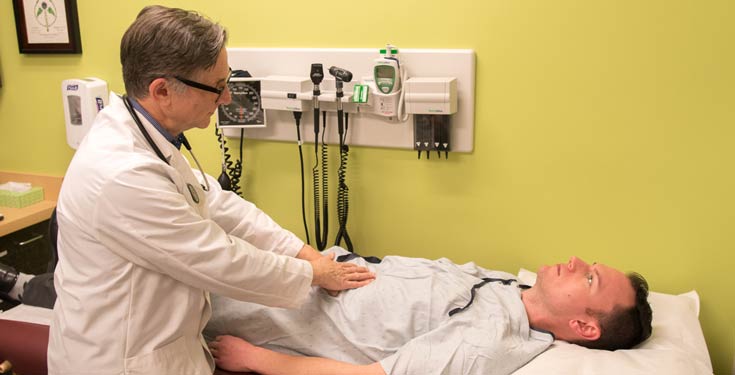NUNM’s SIBO Center offers analysis and results for the SIBO Breath Test to physicians and patients throughout the United States. In addition, NUNM’s team of naturopathic doctors, acupuncturists and student interns are available to serve patients and their individual SIBO needs with a holistic approach.
SIBO Center’s Steven Sandberg-Lewis, ND (’78), discusses the top indicators of SIBO. Want to learn more about SIBO? Sign up for their newsletter and visit the SIBO Center website.

When gathering information about digestive problems from those who seek my help, I have found the following nine key patterns to be strong indicators that small intestine bacterial overgrowth may be all or part of the cause:
- Dramatic transient improvement in digestive symptoms after antibiotic treatment
Often people tell me that they took a course of cipro for a urinary tract infection or flagyl for a vaginal infection and noticed that chronic bloating, abdominal pain or constipation/diarrhea problems suddenly were significantly better. The symptoms usually return within a few weeks, but the scenario is a tip off that bacterial overgrowth may be associated with the digestive issues. - Worsening of GI symptoms from probiotics (prebiotics)
Probiotics may contain significant doses of added prebiotics as well. Examples are fructooligosaccharides (FOS) and inulin. These carbohydrates provide food for intestinal flora. If the small intestine flora are overgrown, as in SIBO, these supplements may aggravate the GI symptoms and be a sign that SIBO is all or part of the problem. - Fiber worsens their constipation (& other GI symptoms)
Dietary fiber can provide structural bulk to the stool, hold water to give bowel movements the proper form and give intestinal flora the material to make beneficial short chain fatty acids. Fiber, as with prebiotics discussed above, can also be used as food for intestinal flora and kick up the intensity of SIBO symptoms. - Insufficient improvement from a strict gluten-free diet for celiac patients
Intestinal hyperpermeability (“leaky gut”) and SIBO are common issues for celiac patients. One of the reasons that a gluten-free diet may fail to lead to significant improvement in GI symptoms is that gluten-free products are often made with gums and starches. Most gluten-free grains do not have the same viscosity and ability to bind ingredients as does gluten. Potato starch, guar gum, xanthan gum and other binding agents are often added to recipes. These may serve as food for the overgrown bacteria and aggravate the SIBO, masking the benefits of the gluten-free diet. - Chronic GI symptoms after having taken proton pump inhibitors
Stomach acid is part of the protective mechanism of the small intestine. Acid leaves the stomach and enters the duodenum (first part of the small intestine) where it mixes with pancreatic enzymes and bile. This combination of secretions has a strong inhibitory effect on bacterial growth and therefore is part of the natural protection against SIBO. Proton pump inhibitors reduce the acidity of stomach secretions and can therefore be “the straw that breaks the camel’s back” when other factors that promote SIBO are present as well. - Chronic GI symptoms after taking opiates or undergoing an abdominal or pelvic surgical procedure
Narcotics such as oxycodone, hydrocodone, morphine, etc. are often prescribed for acute or chronic pain after surgery or other painful conditions. They can reduce pain but also have the effect of slowing intestinal transit (motility) and causing constipation. When motility slows in the small intestine, bacteria do not get flushed out and may multiply – leading to SIBO. Many of my patients report that their digestive problems began after surgery, which may be due to this slowing effect of narcotics or perhaps due to the normal temporary paralysis of the intestine that occurs following abdominal surgery. Adhesions (bands of scar tissue) may also form in the weeks and months following surgery and provide areas for increased growth of microorganisms. - Chronic GI symptoms after taking (long term) broad spectrum antibiotics
I have had many patients that tell me that their digestive problems started after taking antibiotics prescribed to treat Helicobacter pylori, Clostridium difficile diarrhea, Lyme disease, chronic sinus or urinary tract infections, acne or other conditions. When the microbial balance is disturbed by such treatments, overgrowth of the normal bacterial inhabitants of the small intestine may occur – leading to SIBO. - Chronic low ferritin or iron with no other cause
Intestinal bacteria love iron and use it for their functions and growth. They may “take it” before their human host can absorb it and therefore cause an iron deficiency to develop. This may result in anemia, or just an iron deficiency without anemia. In either case, otherwise unexplained iron deficiency may be a clue that SIBO is present. An elevated serum folic acid test may also be a clue that SIBO is present. - Post-infectious IBS
Research shows that when food poisoning, traveler’s diarrhea or acute bacterial gastroenteritis occurs, there is about a 10% chance that post-infectious IBS will develop. Most cases of post-infectious IBS are just SIBO. The immune system may produce antibodies to a toxin present in the bacteria that cause these acute types of diarrhea (or vomiting) and set the stage for chronic SIBO. The original bacterial cause (Campylobacter, abnormal E. coli, Salmonella, etc.) is long gone, but the antibodies can remain for years and lead to slowed motility and SIBO.
If any of these patterns apply to you, ask your doctor if this may be a clue to the cause behind your digestive symptoms. A lactulose or glucose breath test performed by the SIBO Center lab may help start to solve the mystery.